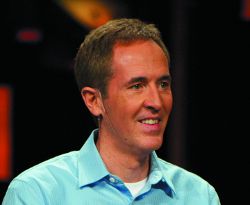 Create a system that frees and empowers leaders to do what they do best
Create a system that frees and empowers leaders to do what they do best
I constantly remind our leaders, The sermon begins in the parking lot. By the time I stand up to deliverwhat is traditionally considered the message, everybodyin our audience has already received a dozen or moremessages. Many have already made up their minds as towhether they will come back the following week.
Thesame is true for your church. The quality, consistencyand personal impact of your ministry environments defineyour church. Whether you refer to them as classes, programs, ministries or services, at their core they are environments that involve a physical setting combined with some type of presentation.
As stewards of a local church, we should determine the messages our environments communicate. Your ministry leaders need to know what makes an environment great as your organization defines great. Defining what a great environment looks and feels like ahead of time provides a powerful safeguard for your entire ministry culture. When it comes to creating great, irresistible environments, we ask three key questions:
- Is the setting appealing?
- Is the presentation engaging?
- Is the content helpful?
For this article, I want to focus on the second question. Engaging presentations are central to the success of the church’s mission. We are the only entity charged with the responsibility of presenting the gospel. So we need to be good at it. Here are some things we’ve learned along the way.
Engaging presentations require engaging presenters. However, engaging presenters are not always good content creators. Likewise, some insightful content creators have no business on a stage with a microphone.
In church world, however, we have a tendency to expect content creators to be engaging presenters and presenters to be great content creators. If your system depends on your staff and volunteers being proficient in two or three of these disciplines, you’ll always get mediocre results. You need a system that allows engaging presenters to present, skilled content creators to create content, and relationally savvy group leaders to facilitate groups.
Now here’s something I know about your church. Somewhere in your congregation are people who make a living presenting information. You’ve got a bunch of teachers in your church. The last thing they want to do is sit in circles with eight children for an hour on Sundays. But they know how to organize content. And some of them would love to present the Bible story as long as they don’t have to take ownership of a small group.
We’ve gone to great lengths to create a system that frees communicators and content developers to do what they do best. The corollary is we’ve gone to great lengths to protect our audiences from presenters who aren’t engaging. We choose our most engaging presenters, give them great content and then turn them loose. And we use those presenters in different departments throughout our church.
Engaging presentations aren’t limited to talking heads. As a general rule, if you can present something in any way other than someonestanding on a stage and talking, do so! If you can communicate something via video, go video. There’s so much more we could talk about under thisheading: visuals, interviews, note-taking outlines. All those things add an element of engagement.
The bottom line is this: Do what it takes to create a culture characterized by a relentless commitment to engaging presentations at every level of the organization. Your message is too important to do anything less than that.
If a presentation of any kind is going to be made in your church, it should be engaging. Set the bar high. Adjust your system or model so that your best presenters are presenting. Find the theologically astute thinkers in your crowd who might be good at helping with content. Employ the skills of your teachers and educators. Design a system that frees your small group leaders to facilitate rather than present. At every level of your organization ask: Was the presentation engaging?
Andy Stanley is the founding and lead pastor of North Point Community Church. He is a sought-after speaker and leadership mentor with a special passion for raising up the next generation of leaders. A best-selling author, some of his many books include Choosing to Cheat, The Best Question Ever, The Next Generation Leader, Visioneering and Deep and Wide, slated to release this fall. Adapted with permission from Deep and Wild: Creating Churches Unchurched People Love to Attend by Andy Stanley (Zondervan). Copyright © 2012.
Get Spirit-filled content delivered right to your inbox! Click here to subscribe to our newsletter.
Dr. Mark Rutland's
National Institute of Christian Leadership (NICL)
The NICL is one of the top leadership training programs in the U.S. taught by Dr. Mark Rutland. If you're the type of leader that likes to have total control over every aspect of your ministry and your future success, the NICL is right for you!
FREE NICL MINI-COURSE - Enroll for 3-hours of training from Dr. Rutland's full leadership course. Experience the NICL and decide if this training is right for you and your team.
Do you feel stuck? Do you feel like you’re not growing? Do you need help from an expert in leadership? There is no other leadership training like the NICL. Gain the leadership skills and confidence you need to lead your church, business or ministry. Get ready to accomplish all of your God-given dreams. CLICK HERE for NICL training dates and details.The NICL Online is an option for any leader with time or schedule constraints. It's also for leaders who want to expedite their training to receive advanced standing for Master Level credit hours. Work through Dr. Rutland's full training from the comfort of your home or ministry at your pace. Learn more about NICL Online. Learn more about NICL Online.


